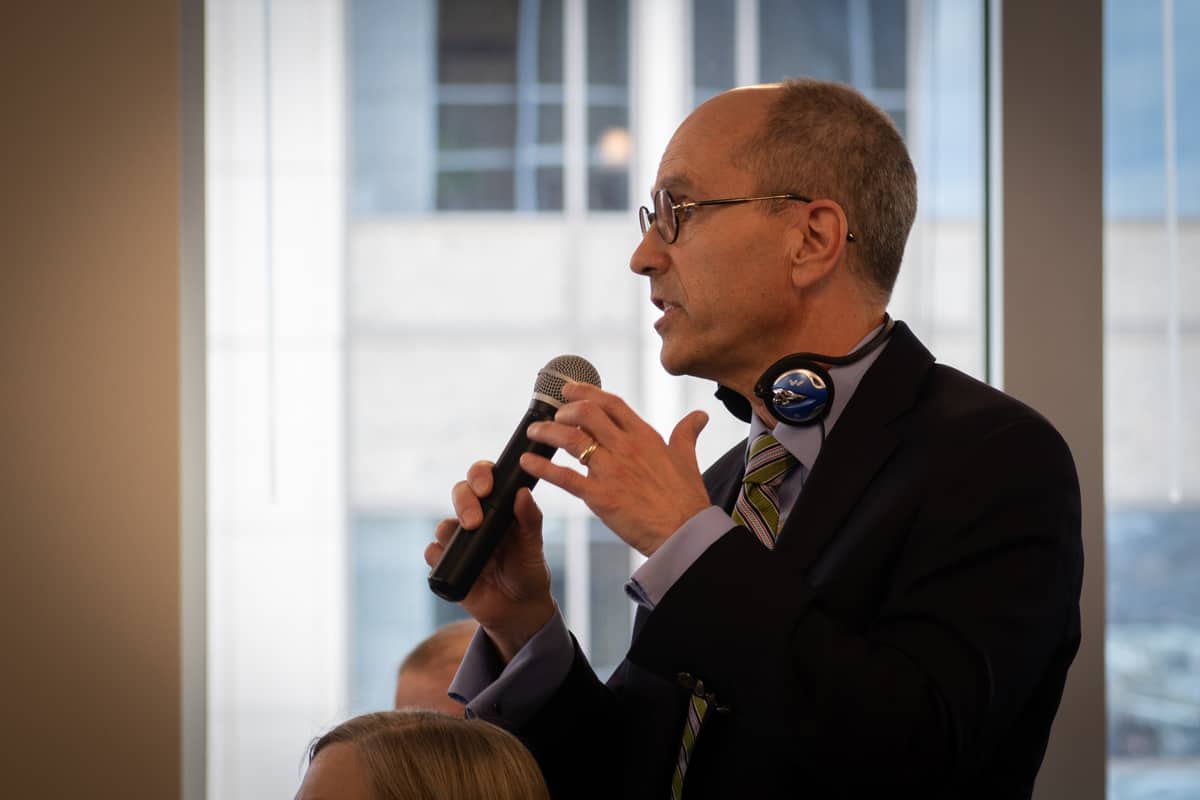
Written by William C. Duncan
March 11, 2020
Earlier this week, religious and government leaders from the country of Azerbaijan visited Utah for a discussion – hosted by Sutherland Institute – of principles important to religious freedom.
During the discussion, titled “Multifaith Harmony: Religious Pluralism and Tolerance in a Majority-Muslim Country,” these leaders from Azerbaijan – whose neighbors include Russia on the north, Armenia on the west, Iran on the south and the Caspian Sea on the east – showed us three principles important to religious freedom: (1) devotion to your own beliefs can create appreciation for differing beliefs, (2) peaceful coexistence requires more than tolerance, and (3) multicultural appreciation requires active effort.
The event was presented by the Stirling Foundation, a nonprofit organization headquartered in Utah that conducts humanitarian and development projects internationally. The two panels comprised government and religious leaders from Azerbaijan who had come to Utah as part of a delegation organized by the Consulate General of the Republic of Azerbaijan, which is based in Los Angeles.
The government leaders who spoke were: Gunduz Ismayilov, Deputy Chairman of the State Committee on Religious Associations; Ravan Hasanov, Executive Director, Baku International Multiculturalism Center; and Dr. Mehman Ismayilov, Executive Director, Foundation for Promotion of Moral Values.

The religious leaders who spoke were: Alexandr Sharovski, Chairman, European Jewish Community of Azerbaijan; Elnur Afandiyev, Russian Orthodox Church of Azerbaijan; and Fuad Nurullayev, Deputy Chairman, Caucasus Muslims Board.

While the speakers stressed similarities between Azerbaijan and Utah (the mountains, strong commitment to family), the context of Azerbaijan’s unique history made the presentations compelling.
Azerbaijan has historically been a crossroads of East and West, Islam and Christianity, and Shia and Sunni Muslims. The population is 96% Muslim, but there are vibrant Jewish and Christian communities.
As Bishop Afandiyev noted, until the collapse of the Soviet Union, Azerbaijan was dominated by a nation with a formal hostility to religion at its core. Currently, it is in an ongoing dispute with Armenia. One panelist described being displaced at 10 years old because of the conflict. Azerbaijan is an ally of the United States and has a good relationship with Israel.
The panelists’ descriptions of interfaith brotherhood were deep and sincere. The government panelists disavowed the ideal of tolerance, preferring multiculturalism, which they described as more expansive – actively appreciating those with other beliefs. Muslims, Jews and Christians have coexisted in the area for thousands of years.
At the same time, the government has worked to dampen extremism and radicalism that would threaten the nation’s secular democracy. Uniquely, as Nurullayev described, Sunni and Shia Muslims worship side by side in Azerbaijani mosques.
So, what can we learn from Azerbaijan’s experience? Three initial principles stood out:
-
Sincere appreciation for the different beliefs and experience of others is enhanced by, not competitive with, sincere dedication to one’s own beliefs. Nurullayev relayed the teachings of Azerbaijani Muslim leaders that being faithful to their beliefs obligated them to respect the beliefs of others. Deep faith, even in specific religious teachings, does not need to threaten appreciation for those with whom one disagrees. Perhaps this is because deep commitment creates empathy for others with deep commitment.
-
Tolerance, if it is understood merely as putting up with others who annoy us, is not a high enough aspiration if our goal is for productive coexistence. As the religious leader panel demonstrated, knowing and appreciating those with different beliefs – which requires active listening and mutual support – is a more secure foundation. The majority Muslim population of Azerbaijan, we were told, even provides financial support for the sacred spaces of other religions.
-
Multicultural appreciation is not a passive virtue. It takes real, sustained effort. Azerbaijan has created a government agency to promote this work. That agency and other private organizations have created a curriculum to teach the principle of multiculturalism because they know it won’t just happen by itself.
Azerbaijan’s context is unique, and it surely has challenges like any nation, but the panelists at Sutherland demonstrated that a nation can work toward an aspiration higher than grudging co-residence while valuing religion as an important part of society.
More Insights
Read More
What would a parent-teacher ‘handshake’ look like in Utah?
This partnership does not allow either party to pass blame entirely to the other. There is no scapegoat, only opportunities for either party or both to work on the factors within their scope.
Restoring “The Soul of Civility” in America, with Alexandra Hudson
Most people would agree that civility seems to be in short supply in our current political environment. But in recent years, a growing chorus of voices across the political spectrum has been calling for a return to principles of civility in politics, as well as all areas of public life.
How Utah is supporting teachers
As Utah policymakers adapt to the needs of students, their policies have been proactive toward teachers’ needs as well.


